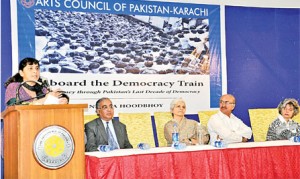
Karachi, Feb 2: Speakers at the launching ceremony of the book titled: “Aboard the Democracy Train: a Journey through Pakistan’s Last Decade of Democracy”, authored by eminent journalist Nafisa Hoodbhoy, called for learning lessons from the derailment of democracy in the country in 1990s. The event was organised by the Arts Council of Pakistan (ACP) here on Saturday.
“We should learn lesson from the horrible consequences the country suffered owing to frequent interruptions in the nascent democratic process,” said Nafisa Hoodbhoy while speaking and answering questions from the audience.
“I am not fond of the present government but I do realise that it is also facing extreme difficult situation,” she added. Nafisa asked as to how stable policy and development would take place when the rulers would be concerned that they may be sent home tomorrow. To some extent, she agreed to the questioner that the democratic struggle during 1980s was linked with the struggle for the rights of women, minorities and human rights but “now the democratic question was linked merely with power politics”.
She, however, opined that much part of this blame should go to those forces which interrupted the democratic process from 1988 to 1999 as no regime was allowed to complete its tenure. She believed that the problems, which the country and particularly Karachi was facing today was the result of the war on terror and Pakistan’s role in it.
“There is a great deal of anti-US sentiments in Pakistan but we need to adopt political approach and objectivity towards the US,” suggested Nafisa.
She said that Washington could not be blamed for all the ills being faced by Islamabad. “There is absence of governance and lack of planning and Pakistan needs to blame itself for it,” she added.
About the book and herself, Nafisa said: “This is a book for the people who are interested in the inside story of Pakistan. It is one that I undertook to write because of my front line access to top politicians and exclusive information obtained while working as a political reporter in Karachi in the 1980s.”
She said she was the only woman reporter at a turning point in Pakistan’s history. “The event, still etched in the minds of millions of Pakistanis…Gen. Zia’s plane crash of August 1988… catapulted me to cover Benazir Bhutto’s bid to mobilize the masses,” she said.
“There are five main aspects of the book,” said eminent scholar Dr. Jaffar Ahmed.
Firstly, Nafisa has strong realization that Pakistani society happens to be patriarchic and in such society women have to launch “extra-ordinary struggle” for the rights and make their presence felt.
“She (Nafisa) had developed a longing for Benazir Bhutto because of her (BB’s) extra-ordinary struggle against the despot rule,” said Dr. Ahmed, head of Pakistan Study Centre of Karachi University.
She also realised that if women come out in the field they would find that there was a large number of people who would join their struggle.
“Nafisa broke the taboos and gender bias by working in the field as reporter,” said Prof. Ahmed.
Secondly, Nafisa belonged to what it is believed as “elite class” but despite this she had developed longing for the poor and deprived ones. This was evident from her visits to rural areas of Sindh. She was highly critical of the “classed society” of Sindh and this was very significant thing of her book.
Thirdly, another important aspect of Nafisa’s book was that she has described the ethnic question or ethnic hatred in Sindh objectively. She has stated as to how the “majority was turned into minority” and as to how the failure to manage it resulted in the polarization and fragmentation of society in Sindh.
“Nafisa’s approach is objective and without any bias,” said Prof Ahmed, adding that she has also presented “remedy of this polarization” in her book.
Fourthly, Nafisa loved Benazir Bhutto from the core of her heart and somewhere in her book she appears to be “obsessed” with her but despite this love and longing for the political leader she (Hoodbhoy) did not desist from criticizing the flaws and failures of the BB’s two tenures.
“This shows that she has a commitment with the democracy and not with any political leader,” believed Jaffar, adding that she was not willing to compromise on her democratic principles.
The fifth aspect of the book pertained to Nafisa’s criticism on the Pakistan’s role after 9/11 and geo-strategic situation in the region. Nafisa believed that whatever lawlessness Pakistan was facing today was the result of the country’s unstinted support to the US-led war on terror.
“The basic thing is that Hoodbhoy’s book is politically correct book, which is written from the democratic perspective,” concluded Dr. Jaffar Ahmed.
Journalist and novelist Muhammad Hanif said what struck him was that the book has been written as “first person” and he knew that it was a very difficult task but she managed to strike a balance in personal as well as political history of Pakistan.
He opined that the book was not the political history of Pakistan, instead it was a “reporter’s diary” about the events of last 20 years, which provide “brilliant perspective about today’s life as well”.
“Nafisa, a bright and hard working reporter chased the murder and rape cases and took them to the conclusion,” said Hanif.
He said the book was also partly a love story as Nafisa found her life partner through her journalistic work.
Rights activist Zohra Yousuf said that the book was being launched at an appropriate time as it was the first time that an elected government was completing its tenure without any interruption.
Though the democratic regime was marked by uncertainty and the rights abuses, it was quite an achievement in the history of Pakistan, she said.
Zohra opined that the democracy should not be taken in narrow sense and stressed for debating the quality of the democratic regime, specially its poor governance. At the same time, she also underlined the importance of assessing the role of what she called two big brothers namely the “army and now judiciary” under which, this government worked.
“The book starts with the transition in 1988 i.e. after the death of Gen. Zia in plane crash and it resonates with us and make us realize its tragic aftermath in the assassination of Benazir Bhutto,” said Zohra who also worked as journalist in 1980s.
Referring to perpetual act of sabotage in the shape of destruction of democracy thrice by the ambitious military generals, Ms Yousuf believed that lately the militancy was posing serious challenge to democracy.
“We did not exactly know who killed BB but at least officially it was said that the militants assassinated her,” she said, adding that the latest victim of the militancy was ANP leader Bashir Bilour.
About the book and its author, Zohra said that Nafisa’s approach was journalistic and not academic, and it makes very easy to read it.
“She (Nafisa) brings back memories and regrets such as things would have been much better today if the democracy had not been derailed,” said Zohra.
She also highlighted the “sordid events” which determined the democracy today.
“Though Ms Hoodbhoy had been close to the people in power, she is objective and she narrates democracy honestly and in straightforward and engaging manner,” she added.
Nafisa described the compromises through which the democracy was brought back such as NRO and departure of Gen. Pervez Musharraf that were not considered as happy developments.
She (Nafisa) also believed that Asif Zardari was the most unlikely person to lead the present democratic setup.
At the end of her speech, Zohra suggested Nafisa to “revisit the train to democracy”.
Eminent columnist Zubaida Mustafa, who chaired the book launching ceremony, recalled that she was inspired to see the determination and courage of Nafisa when she chose to become reporter of Dawn in Karachi in 1980s, as there were only two or three women journalists at that time.
Nafisa was humbled when Zubaida said that not only young generation but old generation like her learnt a lot from her reports. She said those were the difficult times for the reporters to collect news and bring truth to the readers. Zubaida also recalled the adverse situation which Nafisa faced while covering events in Karachi.
Editor Jang Nazir Leghari recalled the era of censorship and curbs on freedom of media during the military regime of Gen. Zia to the extent that reporters working in the head offices of the newspapers were not allowed covering the political gatherings of the MRD in other districts.
He also named such political personalities who were closed to the military ruler in 1980s but now their sons have become champions of democracy in both the PML-N and the PPP.
President ACP Muhammad Ahmed Shah and Dr. Ayub Sheikh also expressed their views at the largely attended ceremony.
The audience gave standing ovation to both Nafisa Hoodbhoy and Zubaida Mustafa for their work.
Earlier, one minute silence was observed for the departed soul of former editor, novelist and lawyer Siraj-ul-Haq Memon who passed away in the city on Friday night.

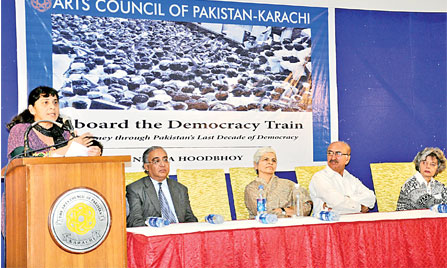
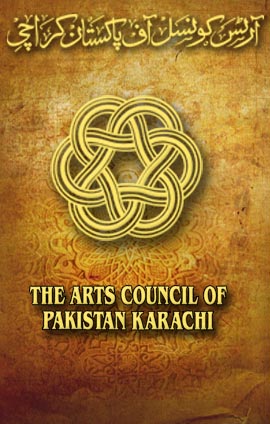
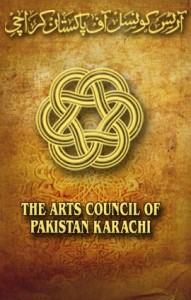

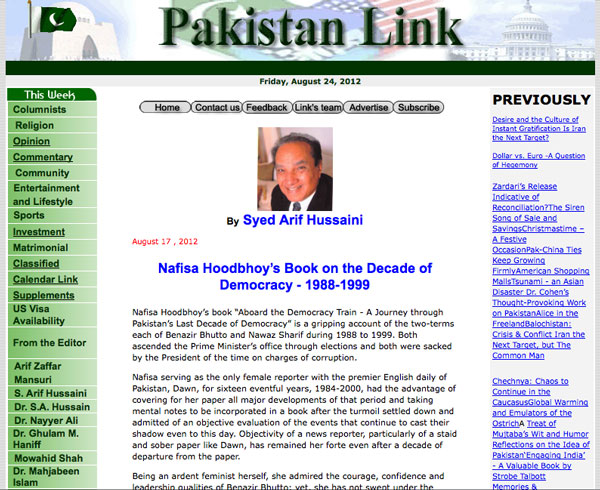
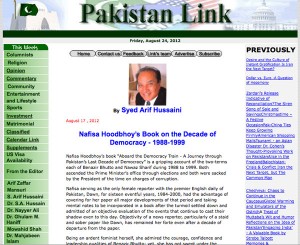
 The Indian edition of ‘Aboard the Democracy Train,’ will be released in India in September 2012, courtesy Anthem Press.
The Indian edition of ‘Aboard the Democracy Train,’ will be released in India in September 2012, courtesy Anthem Press.